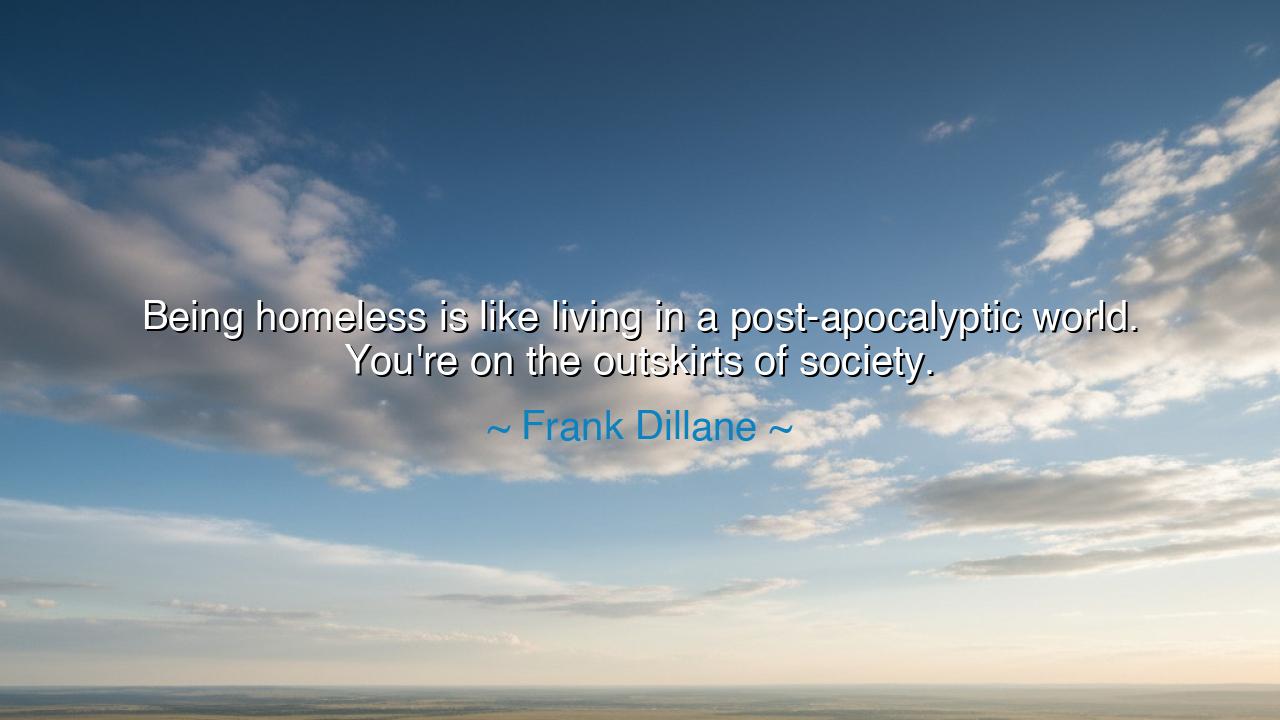
Being homeless is like living in a post-apocalyptic world. You're
Being homeless is like living in a post-apocalyptic world. You're on the outskirts of society.






Hear the words of Frank Dillane, words heavy with sorrow, yet blazing with truth: “Being homeless is like living in a post-apocalyptic world. You’re on the outskirts of society.” These words carry more than description—they are a lament, a cry from the edge of human experience. They remind us that homelessness is not merely the absence of a roof, but the stripping away of dignity, of safety, of belonging. It is to live as though the world has ended for you while it continues for others, to stand among ruins while others dwell in palaces.
To be homeless is to be unseen. The bustling society continues in its rhythm—markets open, schools ring their bells, offices hum with commerce—yet for those cast out, it is as if a great wall has been built. They live on the margins, in shelters, in alleys, under bridges, surviving on scraps. The phrase “post-apocalyptic world” is no exaggeration: for in such a state, every day becomes a struggle for food, warmth, and protection, as though civilization itself had collapsed. The outskirts of society are not faraway deserts; they are the hidden corners of our cities where the forgotten dwell.
Consider the story of the Great Depression in the 1930s, when millions of families in America lost homes and livelihoods. The land was dotted with “Hoovervilles,” makeshift shantytowns of wood and tin, where once-proud workers and their families lived in destitution. For them, it was as though the dream of progress had ended; the shining towers of prosperity seemed distant and unreachable, and they, too, lived on the outskirts of society, watching from the shadows as others passed them by. Yet from this suffering rose new calls for justice, for social programs, for compassion to lift the broken back into the circle of belonging.
The same truth can be seen in the streets of any great city today. In Los Angeles, London, Mumbai, or Manila, tents line sidewalks, cardboard becomes a bed, and hunger gnaws at the belly. And yet, as passersby hurry past, many look away, as though not seeing erases the problem. But the wisdom in Dillane’s words is that the homeless already live in a world broken apart, a world without the protections and securities of civilization. For them, the apocalypse has already come—not through fire or war, but through neglect.
The heart of this quote is a mirror held before us: it shows that homelessness is not only about those who suffer, but about the failure of the greater society. When men and women are left on the outskirts, cast into a shadow-world, it is not only their dignity that is diminished, but ours as well. A people who can feast while their neighbors starve, who can walk warm while their brothers freeze, are a people who have lost sight of humanity. The apocalypse is not theirs alone; it is a wound in the heart of the whole community.
The lesson, then, is clear: to heal society, we must bring the homeless back from the edges. We must refuse to treat them as invisible, refuse to see them as burdens. Instead, we must recognize their humanity, their stories, their struggles. For every person on the outskirts was once in the center—a worker, a parent, a child—until life’s storms cast them aside. To restore them is not charity alone; it is justice, it is the reclaiming of our shared humanity.
Therefore, O listener, let your actions be these: open your eyes to those in the margins; do not pass them by as shadows. Support shelters, demand policies that provide housing, education, and opportunity. Offer compassion where the world has offered none. And in your own life, measure greatness not by what you gain, but by whom you lift from the dust. For a society is not judged by its monuments, but by how it treats those cast to the outskirts. Remember Dillane’s warning: the apocalypse already lives among us in the suffering of the homeless. To ignore it is to let the ruins spread; to face it with compassion is to rebuild civilization itself.






AAdministratorAdministrator
Welcome, honored guests. Please leave a comment, we will respond soon